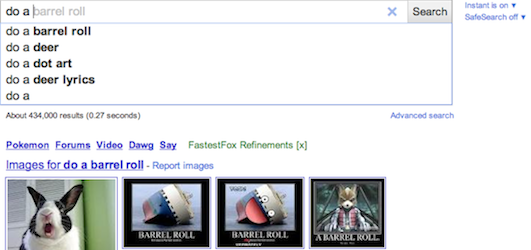Google Uncensors “Bisexual” From Instant Search?
Cautiously Optimistic

It’s been two years now since Google unveiled Instant Search, so long, in fact, that I couldn’t remember what it was called anymore. Lets have a refresher: two years ago Google changed the way they display search results from waiting for you to press enter before showing a static page, to displaying a constantly refreshing page of guesses based on the characters you’d typed in so far. The problem with this that many people immediately raised was that nobody was going to want to search for words like “sextillion,” “pork,” or “book,” seeing as how those words share initial letters with “sex,” “porn,” and “boobs.”
No worries, Google had a plan for that: certain words would not call in the instant search function, and instead would require folks to press enter to see anything other than a blank page. These words would offer no autocorrects, no suggested searches, and feature no results. Which seemed reasonable until Instant Search was rolled out, revealing that included on that list of words was “lesbian,” and “bisexual,” but not, for example, “ex-gay.”
It’s taken two years, but BiNet says they’ve managed to get Google to rescind its policy on “bisexual” as a term that does not work with Instant Search.
BiNet, a bisexual advocacy group, has spearheaded a campaign to get Google to “unlock” the word. According to them, not only was it not a part of autocomplete, but it was also downranked in Google’s search algorithm, pushing webpages that corresponded to “bisexual” in their search terms below webpages that did not. From BiNet, last week:
BiNet USA is pleased to confirm that Google Inc. has unblocked the term “bisexual” from its search algorithm. Now that “bisexual” is allowed, terms such as “bisexual quotes”, “bisexual rights”, and “bisexual parenting” are automatically suggested to Google users. “It’s not every day one of the biggest companies in the world changes its mind, but we are thankful that Google now sees bisexual people just like everyone else,” said BiNet USA President Faith Cheltenham. “It will take time for bisexual search terms to be ranked as they were before the ban, but now bisexual people and their allies have a fighting chance to be seen, heard, and understood.”
As of the writing on this post, however, I was unable to get “bisexual” to either autocomplete, show Instant Google Search results, or suggest “quotes,” “rights,” or “parenting.” I can only wonder if the changes have not been rolled out yet, or if they’ve been rolled back already for some reason.
When Instant search premiered, Queerty theorized that Google might not want instant search to display for “lesbian” or “bisexual” because of the predominance of porn on those pages (an idea that a little Googling can disprove), but deftly explained why this still counts as censorship of a sort even if you can still get those search results with one extra keystroke:
One of the joys of searching is accidentally stumbling upon new links and associations you didn’t originally think of — like going into Wikipedia to learn about Alice in Wonderland and ending up reading about psychopharmacology. Often, you don’t often know what you’re interested in until you see it.
By narrowly restricting their search results to avoid poon, Google Instant has perhaps deprived young lesbians who could benefit from learning about lesbian art or lesbian rights if they only knew to keep typing. Google Instant would do better to combine their current SafeSearch filters with Google Instant to offer more robust search results that challenge and educate their users rather than censor them before they’re finished typing.
As I pointed out at the time (Warning: there’s a LOT of foul language used for demonstrative purposes in that post), if Google Instant was not the default Google Search, and it was censoring itself, then Google Search was censoring itself.
(via AfterEllen.)
Have a tip we should know? tips@themarysue.com